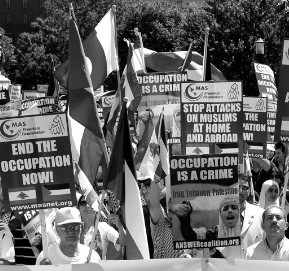On not choosing sides: The peacemaking challenge in Israel/Palestine
The recent escalation of conflict between Israeli and Palestinian forces helps make clear why the rhetoric among liberals and Christians about “the occupation” is woefully inadequate to the challenging call of peacemaking that we espouse. The occupation—which by now needs no subjects, objects, or qualifiers because we all supposedly know what we are talking about—has become the acceptable target that seems to provide a safe platform on which to mount the banner for peace.
If we protest Israel’s occupation of the West Bank as a distinct evil, it seems that we can duck the charge of delegitimizing Israel. We stay on the bright side of the line that gets drawn between criticizing Israeli policies and challenging Jewish sovereignty as a whole. We also get to stand courageously with people who live under daily duress and who have languished without their own sovereignty for far too long. A focus on the occupation gives us simpler options in a complicated conflict. Look at the West Bank and it is not hard to know on whose side compassionate people should stand.
But the violent events of June and July, the outcome of which is still beyond imagining, make it harder to know. Kidnapping and murder of teenage civilians by extremist elements, both Palestinian and Jewish; a barrage of rockets reaching deeper than ever into Israel; drone and missile attacks from Israel on targets precariously if not deliberately situated in dense, civilian neighborhoods—all of these and the clamoring voices that surround, incite, and report them underscore the point that choosing sides over the occupation is both difficult and dangerous, and it does not address enough of the factors that must be resolved if peace is to be achieved.






